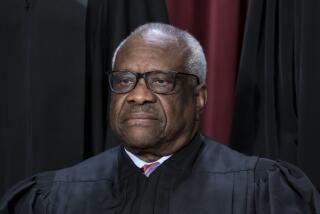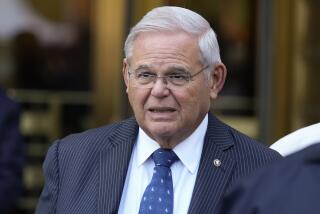PERSONALITY IN THE NEWS : Hearings Put Metzenbaum in Spotlight : Senate: The lawmaker has been aggressive in his questioning of Thomas and Gates. As the liberal point man, he has drawn protests from the GOP.
WASHINGTON — Playing the role of liberal point man, Sen. Howard M. Metzenbaum (D-Ohio) is achieving new prominence as the Senate considers the controversial nominations of Clarence Thomas to the Supreme Court and Robert M. Gates to head the CIA.
Always aggressive, sometimes abrasive, Metzenbaum has been untiring in his critical cross-examinations of the two nominees despite vehement Republican protests that he is vilifying the President’s men.
He clearly was the most relentless questioner as the Senate Judiciary Committee delved into Thomas’ beliefs during the hearings. Metzenbaum tried repeatedly but unsuccessfully to get the black conservative jurist to state his position on abortion.
When Thomas insisted that some of his past, eyebrow-raising statements on such subjects as “natural law” would not affect his actions as a member of the Supreme Court, Metzenbaum showed open disdain.
“I start with the assumption that public officials mean what they say,” the senator bluntly told Thomas. “It’s difficult to accept the notion that the moment you put on that judge’s robe, all the positions and views you held prior to going on the bench just magically disappear.”
As the Senate Intelligence Committee opened hearings this week on the Gates nomination, Metzenbaum displayed the potent combination of skepticism and sarcasm that has become his trademark.
He accused Gates, who was deputy director of the Central Intelligence Agency when the Iran-Contra scandal unfolded in the mid-1980s, of being a “see-no-evil, hear-no-evil” official who closed his eyes to clues about the illegal arms-for-hostages deal.
“I enjoy the fray, and the confrontation gives me additional energy,” Metzenbaum said Tuesday in a telephone interview. “The confrontation is challenging . . . and there’s no incisive questioning coming from the other side of the aisle now.” Yet his constant dashes between committee hearings, together with his frequent efforts to push amendments on the Senate floor, have caused some observers to comment that he is spreading himself too thin.
Still vigorous at the age of 74, the self-made Ohio millionaire may be the last of the red-hot populists in the Senate as he champions consumer causes and occasionally resorts to obstructionist tactics to get his way.
Taking advantage of Senate rules that allow a single senator to delay or block action by a majority, Metzenbaum often has incurred the wrath of his colleagues in the years since he came to Capitol Hill. For a time he was known as “Headline Howard,” and other senators typically groaned each time he pursued another delaying tactic.
In recent years, however, as he accumulated seniority and power as the chairman of Senate Judiciary subcommittee on antitrust and the Energy and Natural Resources subcommittee on energy regulation, he has behaved more like a member of the unofficial “Senate club” that cuts deals behind the scenes and avoids open confrontations.
And when Republican critics complained that he was scheduling hearings for partisan purposes, Metzenbaum once replied: “A senator has to jump up and down and make enough noise to get the bureaucrats to work.”
A veteran of nearly a half-century in politics, Metzenbaum was elected to the Ohio Legislature when he was 25, just out of Ohio State University Law School. His biggest accomplishment during eight years at the Statehouse was passage of a bill regulating consumer credit charges.
After having worked his way through college selling magazines and brushes, he became wealthy by acquiring franchises to operate parking lots at airports. His practice as a labor lawyer helped him to build a political base for statewide campaigns in the 1970s.
Metzenbaum failed in his first two attempts to become a U.S. senator. But in 1973, he was appointed to replace Sen. William Saxbe (R-Ohio), who resigned to become attorney general. John Glenn defeated Metzenbaum in 1974, however, and he had to run again in 1976 before winning his first six-year term.
In 1988, Republicans thought they could eliminate the liberal gadfly by naming Ohio’s most popular GOP figure, then-Cleveland Mayor George V. Voinovich, to oppose him. Voinovich was recently elected governor of Ohio. But Metzenbaum campaigned hard, stressing his leading role in enactment of a law requiring advance notice of plant closings and help for the elderly, and breezed to victory with 57% of the vote.
An unabashed left-winger, Metzenbaum recently launched a Center for Democratic Values to counter the centrist Democratic Leadership Council, declaring that the country “does not need two Republican parties.”
Gradually, he has achieved respect in the Senate for the sincerity of his beliefs, such as his willingness to defy the powerful gun lobby by advocating gun control, and for the sheer energy he puts into his work. Metzenbaum has indicated he will seek a fourth term in 1994.
More to Read
Get the L.A. Times Politics newsletter
Deeply reported insights into legislation, politics and policy from Sacramento, Washington and beyond. In your inbox three times per week.
You may occasionally receive promotional content from the Los Angeles Times.










